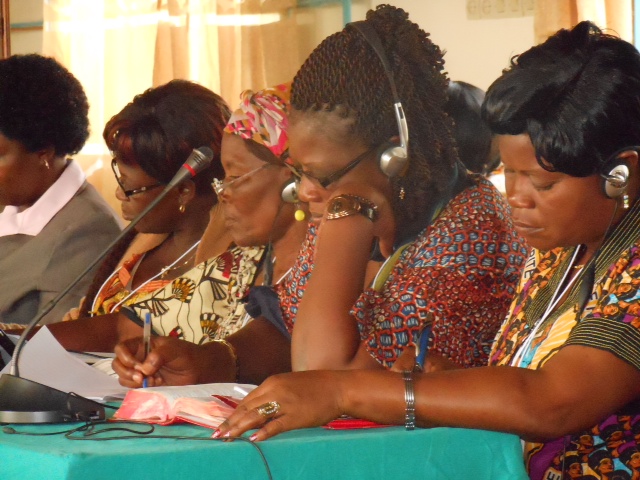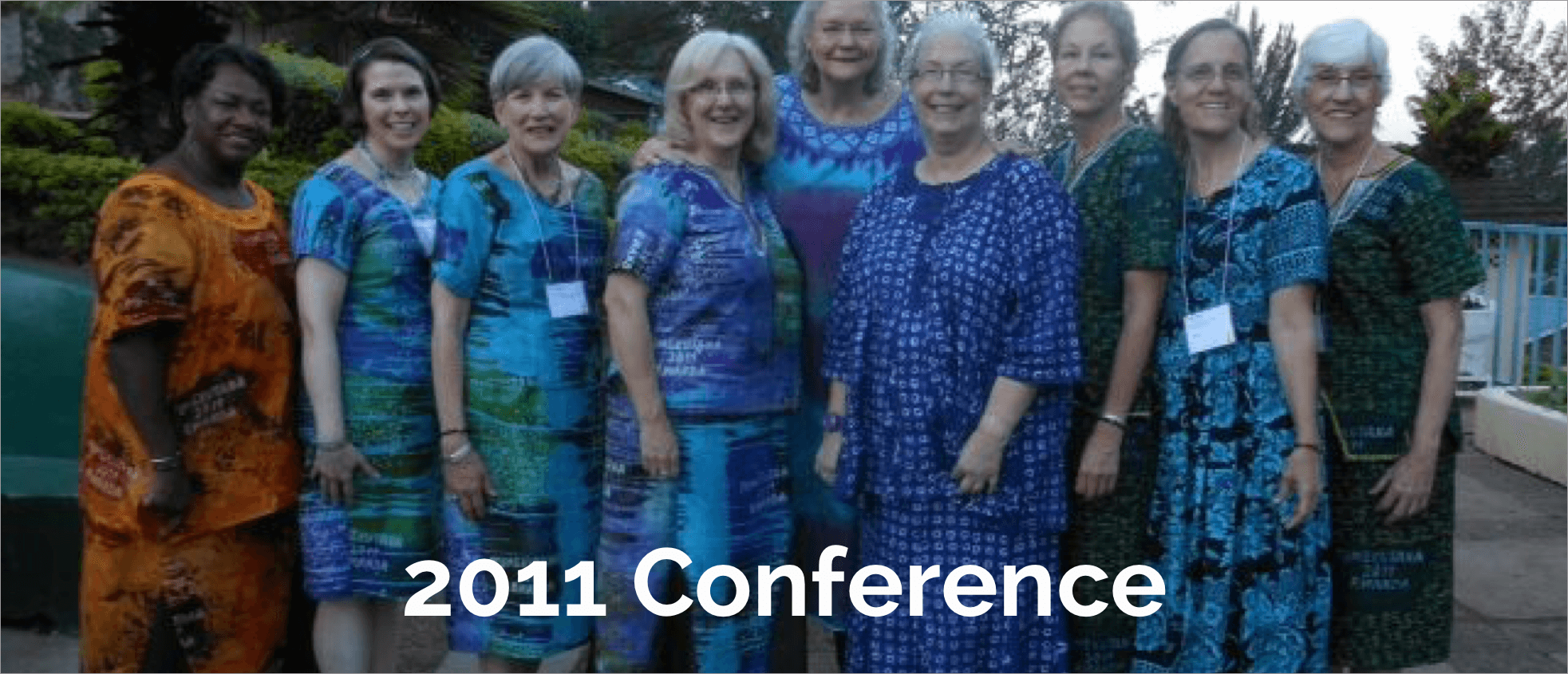“Women as Agents of Peace, Healing and Reconciliation”
“As members of one body, you are called to peace†(Col 3:15)”
History of TumekutanaÂ
Tumekutana means “We Have Come Together.†This conference of Presbyterian Women leaders from Africa was born out of a vision to answer questions asked by Presbyterian Women’s leaders around Africa: “Are our Presbyterian sisters in other countries facing the same challenges?  Are we the only ones suffering?†These needs prompted the organization of Tumekutana conferences.  We came together in 2007 and in 2011 we came together again.  In that gathering in 2007, fifty-one African Presbyterian and Reformed Women leaders from sixteen countries, and eighteen women from the US met in Nairobi, Kenya to share the challenges facing African women.  These African sisters decided that this conference was so important to them that they would meet again. Hoping for a triennial event, we were able to meet again in 2011.
Â
Determination of Place and Content
Tumekutana 2011 was designed especially for Kigali, Rwanda, with the theme “Women as Agents of Peace, Healing, and Reconciliation.†The Steering Team chose Rwanda because of the country’s history with their own peace, healing, and reconciliation and the presence of the strong Presbyterian Church of Rwanda, who could lead us through these issues. Rwanda itself provided the perfect model for the women who will continue to journey together in all circumstances with their people toward attaining full justice, sustainable peace, and reconciliation. It also provided a different region of Africa from the last conference with modestly priced transportation, room, and board that was accessible to our many travelers.
The African Women determined the theme, speakers and venue for the conference and led the planning. American women served primarily as advisors, facilitators and support people. Fifty-three African women traveled to represent eighteen African countries, along with ten women from the US, including several mission workers living in Africa.1 Content of the workshops was determined by the Steering Team, shaped by input from each of the African participants prior to the conference.
During the Conference
While it would be impossible to go into detail for every aspect of the conference, our activities of the week began with preaching and worship at various local churches as an immersion into Rwanda.  We were supported by thoughtful presentations given by our selected speakers, and engaged in a field trip that made the genocide real to all of us.  Our speakers laid the foundation for us to be able to understand how terrible violence can occur, how to find healing, and how to move beyond the act of violence itself into the peace-filled life Christ wanted for us. We learned that “suffering that is not healed, is transferredâ€. Small group times helped us to reflect on what we saw and heard, and importantly, how it impacted our own lives.  This group time in particular provided us with a safe place to share and pray.
The visit to the Kigali Genocide Memorial
The objective of the visit was to understand the background of the genocide and its consequences, and to try and gain a sense of what our Rwandan sisters have gone through and yet still face.  We learned of its historical context, including the differences between Hutus and Tutsi. After a walk through the museum we visited the graves and laid flowers.  Our day continued with a presentation from the Ramera group who included the perspective of both victims and perpetrators of the genocide. They told us how a local pastor who was working through the meaning of his own faith helped enable local people to live together and love one another as neighbors through concrete action. As we gathered that evening in small groups we shared our own personal stories of violence, listened to our own painful stories, and prayed together.  We embodied our theme verse, “As members of one body you are called to peace.†(Col 3:15)
Conference EvaluationsÂ
Conference evaluations captured what we did well, saying:
“I was encouraged to open up and get my wounds healed.†ÂÂ
“We should not underrate any violence, because the damages are enormous.â€
“The importance of forgiveness.  Humans need each other, hence the need to live in harmony.â€
“I will tell my family to promote women’s rights through legal changes and women’s interests in social and economic policy.â€
“We were filled with the peace of Christ. â€
As is typical when we gather together in Africa, logistics and not enough time to talk together provided room for improvement. Several women had trouble with traveling to Rwanda — many connections, delays, for example, and participants noted that they would have benefited from having more time in plenary to discuss outcomes of small groups.  Our simultaneous translation between English and French throughout the conference went very well.  We were challenged to have speaker documents translated ahead of time.  Two sisters from Mozambique spoke only Portuguese, and although they struggled to participate, we could see they fully engaged. The Holy Spirit was at work in our midst.

Role of the Local Church in Rwanda
The participation and support of the Presbyterian Church in Rwanda (EPR), was key to the success of Tumekutana 2011. The early endorsement by the Moderator, including his willingness to sign letters of invitation, dedicate personnel to fully support the planning and the operation of the conference, was vital to the success of the conference . In particular the Women’s Department represented by their director, several women pastors, volunteers in local EPR women’s groups and the Finance Department  put countless hours of hard work toward the effort. Members of women’ groups throughout the country upheld both the planning and the actual conference in regular prayers. Local congregations invited Tumekutana participants to preach on the first day of the conference and warmly welcomed participants to their services. The EPR facilities used were very modestly priced, in good repair, and just right for all our needs.
Tumekutana Elections and the Way Forward
In order to ensure continuity for Tumekutana, participants agreed to elect regional representatives to join the 2011 Steering Team which included Ms. Caryl Weinberg of First Presbyterian Church of Evanston who initiated the idea to bring African Presbyterian women together, Madame Monique Misenga of DR Congo, Mrs. Veronica Muchiri of Kenya, Rev. Dr. Mrs. Bridget Ben-Naimah of Ghana, Rev. Debbie Braaksma, PC(USA) Africa, Dr. Mrs. Amy McAuley, PCUSA-Evanston, Rev. Mrs. Julie Kandema of Rwanda, Mrs. Jessie Fubara-Manuel of Nigeria and the Rev. Janet Guyer, PC(USA) South Africa who served as a consultant to the committee.
Participants went into regions and presented the following as their representatives:
- Rev. Dr. Mrs. Mercy Akpama for West Africa.
- Rev. Mrs. Rose Marie Ibyshaka for East Africa.
- Rev. Dr. Mrs. Bukelwa Hans for Southern Africa.
- Mrs. Rebecca Bikoi for Central Africa.
These representatives are expected to be directly in touch with Presbyterian women in their regions, coordinate their activities related to Tumekutana and liaise between them and the Steering team particularly in terms of dissemination of information. Participants agreed that the newly constituted steering team would plan the way forward and put administrative structures in place to ensure the continuity of Tumekutana. The team would be expected to work towards the provision of administrative needs such as a written constitution to guide activities, funding, and a permanent leadership structure. They would produce periodic Bible study guides for use by participants and plan towards the next Tumekutana conference which would hopefully be held in two years (2014).
Reflections on Tumekutana 2011
Reflecting upon the success of Tumekutana, prayer was a key factor of the development and preparation, as well as uplifting the conference itself. As planning and publicity progressed, people around the US signed up to learn about specific countries and pray for their representative woman by name, once we learned who they would be. Many took the opportunity to connect with these women via e-mail to let the women know they were being bathed in prayer.
Tumekutana began as an idea, and has now become a movement. Friendships that have been formed have led to regular prayer support and connection through communication by phone and e-mail. The steering committee is grateful to have been used by God, to help African sisters “come together†once more. We are thankful for the opportunity Tumekutana provided to draw individuals, congregations, Presbyteries, validated mission support groups of the PC(USA), and the different offices of the PC(USA) together in combined support of African women partners.
“As members of one body, you are called to peace.†(Col 3:15) The coming together for Tumekutana reflects the unity that is portrayed by “the Body of Christ.†This unity is expressed through the sharing of stories, in the shedding of tears, in the time spent in prayer, both in grief and in joy; in learning from our speakers and from each other; in hearing and understanding each other across language, culture, and experience; in our worship that centered on Christ; and in the hopes, dreams and plans made that will help each leader to live out that “calling to peace.â€
For further information regarding Tumekutana, please feel free to contact any of the following participants:Â
- Rev. Debbie Braaksma, PC(USA) Africa, Â debbie.braaksma@pcusa.org
- Rev. Dr. Mrs. Bridget Ben-Naimah, Ghana, Â bben-naimah@ug.edu.gh
- Mrs. Susan Colten, US, Â s.colten@comcast.net
- Rev. Janet Guyer, PC(USA), South Africa, Â jguyer@pobox.com
- Mrs. Jessie Fubara-Manuel, Nigeria, jessiebenebo@yahoo.com
- Rev. Mrs. Julie Kandema, Rwanda, Â juliekandema@yahoo.co.uk
- Dr. Mrs. Amy McAuley, PCUSA-Evanston, Zambia, Â amcauley0@gmail.com
- Madame Monique Misenga, DR Congo, misenga2002@yahoo.fr
- Mrs. Veronica Muchiri, Kenya, njokimuchiri@yahoo.com
- Rev. Mrs. Rose Marie Ibyshaka, Rwanda, akimana_rose@yahoo.com
- Ms. Caryl Weinberg, US, cweinberg@firstpresevanston.org
Conference Testament | Conference Final Report


